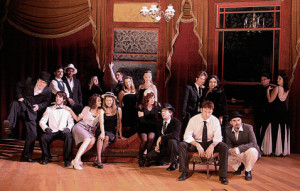 Tricklock Company is committed to international collaboration, artistic risk, physicality, absurdism and poetic work. An essential piece of the company’s programming is its annual Revolutions Festival, featuring local, U.S. and international theatre from countries as diverse as France, Mexico and the nations of Africa. Each January, Tricklock produces three weeks of such exquisite and challenging work as DAH Theatre of Belgrade’s The Story of Tea, including text by Ruth Margraff; Culture Clash in AmeriCCa; NK603 and Requiem, by Violeta Luna and director Roberto Varea; I Was the Voice of Democracy by New Mexican native Brian Herrera; and Sophia’s Drawings from Israel’s Galilee Multicultural Theatre.
Tricklock Company is committed to international collaboration, artistic risk, physicality, absurdism and poetic work. An essential piece of the company’s programming is its annual Revolutions Festival, featuring local, U.S. and international theatre from countries as diverse as France, Mexico and the nations of Africa. Each January, Tricklock produces three weeks of such exquisite and challenging work as DAH Theatre of Belgrade’s The Story of Tea, including text by Ruth Margraff; Culture Clash in AmeriCCa; NK603 and Requiem, by Violeta Luna and director Roberto Varea; I Was the Voice of Democracy by New Mexican native Brian Herrera; and Sophia’s Drawings from Israel’s Galilee Multicultural Theatre.
Hospitality is the reason Tricklock founded the festival, and hospitality remains an ongoing inspiration. In the late ’90s, Tricklock began training and performing with Gardzienice, a Polish experimental/anthropological theatre founded by Wodzimierz Staniewski, a former colleague of Jerzy Grotowski. Welcomed in Warsaw with vodka, sausages and a warm fire, Tricklock founders were deeply moved, and quote Staniewski’s famous saying, “Guest in the House is God in the House.”
When Gardzienice came to tour the U.S. in 2000, Tricklock’s founding artistic director Joe Peracchio saw an opportunity to found Revolutions. “Joe always sees the bigger picture, the potential,” says current co-artistic director Juli Hendren. Tricklock produced Gardzienice and California’s Dell’Arte Company as well as their own show, and the festival was born.
Connections are just as likely to be made over welcome dinners as they are during late-night cabarets, workshops or more formal meetings. Guests tour rare geological formations like New Mexico’s Tent Rocks, or Acoma Pueblo, an ancient village perched high above a windswept plain. Tricklock, in turn, is inspired to unearth the remarkable in its own work.
“We have a lot of talent in New Mexico,” Hendren attests. “We produce work that is different than what can be seen here, work indicative of another country’s culture and history.” The work is physical, often coming from clown, mime or acrobatic traditions. There may be darker components, such as Canada’s Mump and Smoot, or no language at all, as in the work of France’s Macademes.
As tension escalates in the Southwest around racism, land ownership and immigration, it was particularly powerful for Tricklock to begin its newest collaboration with the Ndere Troupe of Uganda, slated for Revolutions 2015. Ndere brings members of 56 different African tribes together to preserve dances, songs, culture and connection to the land. When Tricklock recently visited Uganda (funded in part by the Global Connections: On The Road Initiative, designed by TCG and funded by the Andrew W. Mellon Foundation), the group was greeted with 30 minutes of spontaneous dancing, drumming and singing. Says Hendren, “In the U.S. we can get bogged down with the business of art, from fundraising to administrative tasks, to getting the work out there, when the point of live theatre is to connect people.”

